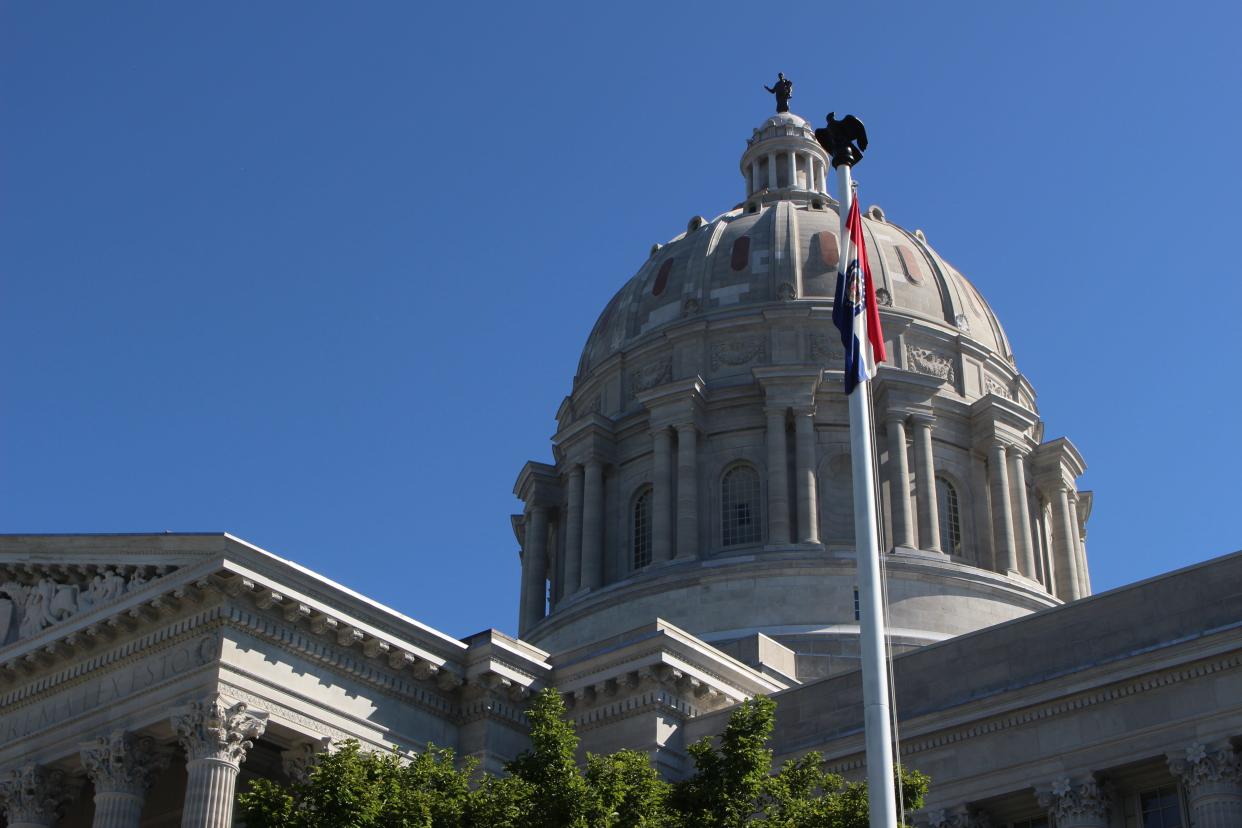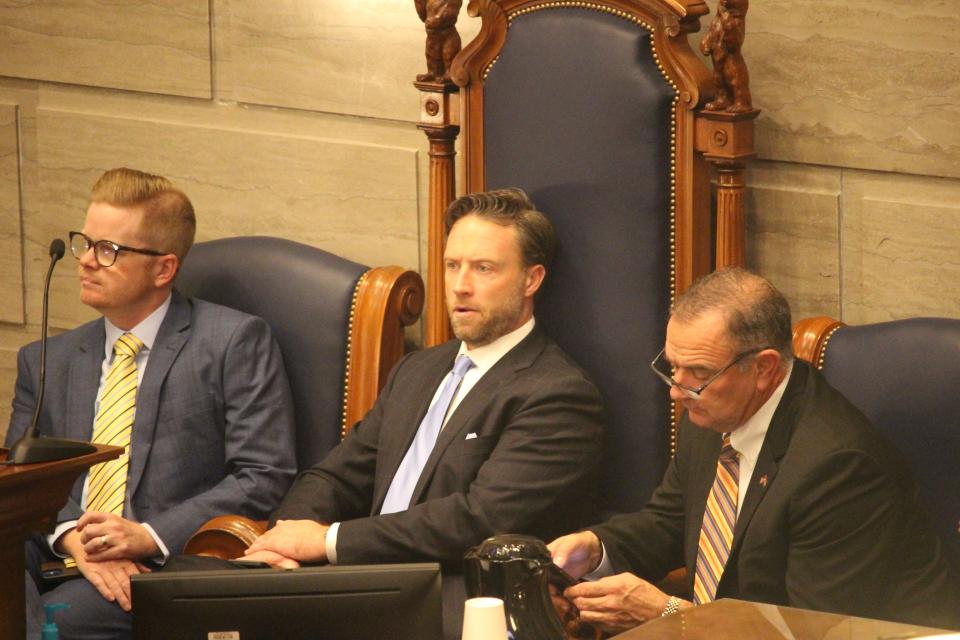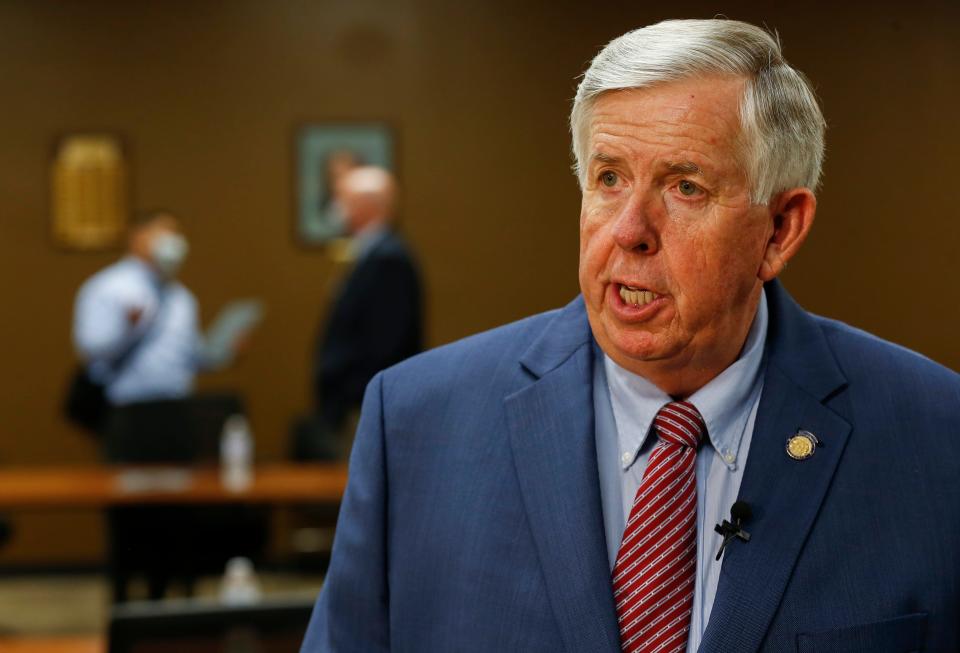Major issues to watch in Missouri's legislature in 2023: Sports betting, education & more

Missouri's legislature is back in session Jan. 4 — and with that hundreds of new bills to be considered, committee hearings, hours of floor debate and amendments.
Specific priorities will become more clear in the first few weeks of the session, as lawmakers establish their key issues and the governor delivers his annual address to the legislature. But here are a few key items you can expect to see action on under the dome of the Capitol over the coming months, with a breakdown of how previous attempts have gone and who will likely be involved.
Sports betting legalization a priority after failure last session
What's on tap: Lawmakers on both sides of the aisle are beyond ready to legalize sports betting in Missouri — if they can parlay a deal among key players.
Context: Last year it became clear that Missouri and Kansas, the bitter rival to the west, were locked in a new Border War: the race to legalize sports betting. Kansas won, allowing sportsbooks to open earlier this year while the Show-Me State had nothing of its own to show. Lawmakers in Jefferson City are hoping to amend that, and quickly.
Recent proposals to legalize sports betting in Missouri have become closely entwined with the legalization of video lottery terminals, those gaming machines you might see in gas stations where you can toss in a few coins to try and win more. That was a non-starter for some lawmakers, including the influential president of the Senate, and so despite a version of the bill passing in the House last session, it never made it through the upper chamber.
There's no shortage of impatience to go around. Lawmakers in both parties, voters and lobbyists (for sportsbooks, casinos and sports teams alike) are all itching for legalization; if not in time to potentially see the Kansas City Chiefs in the Super Bowl, then before the Cardinals and Royals begin their regular season. But a final proposal will have to satisfy both those lobbyists, who wield significant influence in this sphere, as well as the lawmakers who have made their demands on the issue clear.

For those in the western half of the state, the urgency is twofold: On one hand, the state stands to gain significant revenue from sports betting (Kansas raked in about $50 million in the first few weeks, according to estimates). But there are also rumblings that the Chiefs could explore new stadium options across state lines once their current lease is up — a prospect that many Missouri fans can't stomach, and that lawmakers are aiming to avoid at almost any cost.
Who to watch: Sen. Denny Hoskins, a Warrensburg Republican, sponsored one of last year's sports betting bills, and has been insistent on including video lottery terminals in any final proposal. Sen. Tony Luetkemeyer has proposed Senate Bill 30, this year's sports betting bill.
Plus, keep an eye out for Missouri sports executives visiting the Capitol — St. Louis Cardinals president Bill DeWitt III and Chiefs president Mike Donovan have been ardent supporters of legalization, among others.
Education questions galore: Curriculum, teacher pay, charters and choice?
What's on tap: A host of proposals changing numerous aspects of K-12 education in Missouri — restricting curriculum, raising the base salary of teachers, and directing more attention (and students) toward charter schools and private institutions.
Context: Education continues to be a dominant issue in and around the Capitol. Lawmakers were able to forge K-12 legislation last session packed full of bipartisan, largely non-controversial items, bolstering literacy programs and testing water for lead, among others. But they tabled several hot-button issues, which have again been proposed in early bills and will almost certainly see progress this year.
Curriculum restrictions and requirements. A last-minute push to pass a bill requiring schools to more explicitly publicize their curriculum, specifically that relating to race and identity, came up short last session. Concerns from Republicans about how racism and U.S. history is taught in K-12, often ascribed to the concept of "critical race theory," remain this year, and have resulted in several new bills being pre-filed. Several Republicans are also seeking to limit how gender identity and sexual orientation are discussed in classrooms.
Teacher pay. Lawmakers took a major step last session: Faced with severe issues recruiting and retaining teachers, they raised the state's base salary from $25,000 to $38,000. There were a couple catches, though — the raise isn't permanent, only guaranteed for one year; and it requires the districts to foot about 30% of the bill. Districts and K-12 entities, including the state's board of education, have asked for a stable, permanent raise.
School choice and charters. With public schools under more scrutiny from Republicans, the party has sought to find ways to direct more money toward private and charter institutions. Last session, that meant passing legislation that sends more state dollars to charter schools, without taking money away from public districts. In 2021, they passed a tax credit program to fund tuition for students to attend non-public schools. One pre-filed bill seeks to extend that program. It remains to be seen what the exact desired path forward is for lawmakers focused on the issue; currently, charter schools are only allowed to operate under state law in the St. Louis and Kansas City areas.
Who to watch: The new Senate majority leader, Republican Sen. Cindy O'Laughlin of Shelbina, was formerly the chair of the education committee. In a new role, she — and whoever succeeds her as chair of that committee — could make educational issues a top priority. (She's previously called for the ouster of the state's education commissioner.)
When it comes to teacher pay, the budget chairs — Republicans Rep. Cody Smith of Carthage and Sen. Lincoln Hough of Springfield — will wield the most influence. Republicans in the House last year were slightly more resistant to some of the spending in the budget, including teacher pay — during final negotiations, an attempt by several members to lower the salary raise from $38,000 to $34,000 was shot down by senators from their own party.

More:Missouri's board of education weighs open enrollment, backs permanent teacher pay raises
Sunshine Law changes a pet issue for the governor
What's on tap: Legislation seeking to limit the documents made available to the public through the state Sunshine Law could pop up again this year.
Context: This was a priority of Gov. Mike Parson's last session — his office played a key role in drafting language that would exclude certain types of documents and communications from records requests and no longer classify some meetings of elected officials as "public."
The Sunshine Law is a powerful accountability tool not only for the press, but for all sorts of members of the public — city residents seeking access to zoning meetings, elected officials seeking information for investigations of state agencies, lobbyists and researchers, advocacy groups and more. Legislation like the bill proposed last session (which approved by the Senate but never made further progress) would allow the government to hold back some of that information under the justification that they "do not have substantial administrative or operational value."
It remains to be seen whether the governor's office will once again push legislation to weaken public records access, and whether the legislature is up for passing it — especially considering 2023 marks the 50th anniversary of the Sunshine Law's passage.
Who to watch: Last session, Republican Sen. Andrew Koenig of St. Louis County inserted the language Parson's office had requested.

Child care: Finding a path forward for families and businesses
What's on tap: Accessible and affordable child care is a national issue but Missouri lawmakers could look for ways to help in the Show-Me State — a key to relief for both families and employers alike.
Context: The child care industry is struggling, with workers in short supply and often out of the price range of families. Advocates are stressing that it's not just a safety net and families issue — it's a workforce issue, too, as parents struggle to find care for their young children while holding down a 9-to-5.
Lawmakers on both sides of the aisle, along with the governor's office and advocacy groups, have been having conversations about the best path forward on child care. That could come through specific legislative action or, the more likely route, through the state budget — in the form of tax credits, grants or state programs. The leader of the House Democrats has said she believes the governor is preparing a "whole package" to address child care.

Who to watch: Gov. Parson, if he elects to include child care among his personal priorities, could catapult the issue to the top of the list. If it gets there, the House and Senate budget chairs will once again weigh in on any solutions that come through the budget process. This is a ripe issue for Democrats to contribute to, as well — a way to find some bipartisan agreement on social services and the state's safety net, a key issue for many of the party's members.
More:In a post-Roe Missouri, lawmakers turn focus on new mothers' health and child care
Other issues to look out for
Initiative petition changes: Republicans have for years sought to make it more difficult for voter-led changes to land on the ballot and be approved. With a potential abortion referendum coming in 2024, that issue will continue to be a priority.
Transgender athlete restrictions: The GOP has again filed a flurry of bills seeking to restrict the ability of transgender student-athletes to play youth sports. Multiple versions passed the House last session but died in the Senate.
Public safety and crime: The incoming Speaker of the House has indicated that crime and public safety will be a top issue for the session; however, it remains to be seen what legislative solutions will look like.
Galen Bacharier covers Missouri politics & government for the News-Leader. Contact him at gbacharier@news-leader.com, (573) 219-7440 or on Twitter @galenbacharier.
This article originally appeared on Springfield News-Leader: Sports betting & more: Issues to watch this year in MO's legislature

